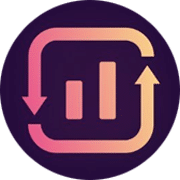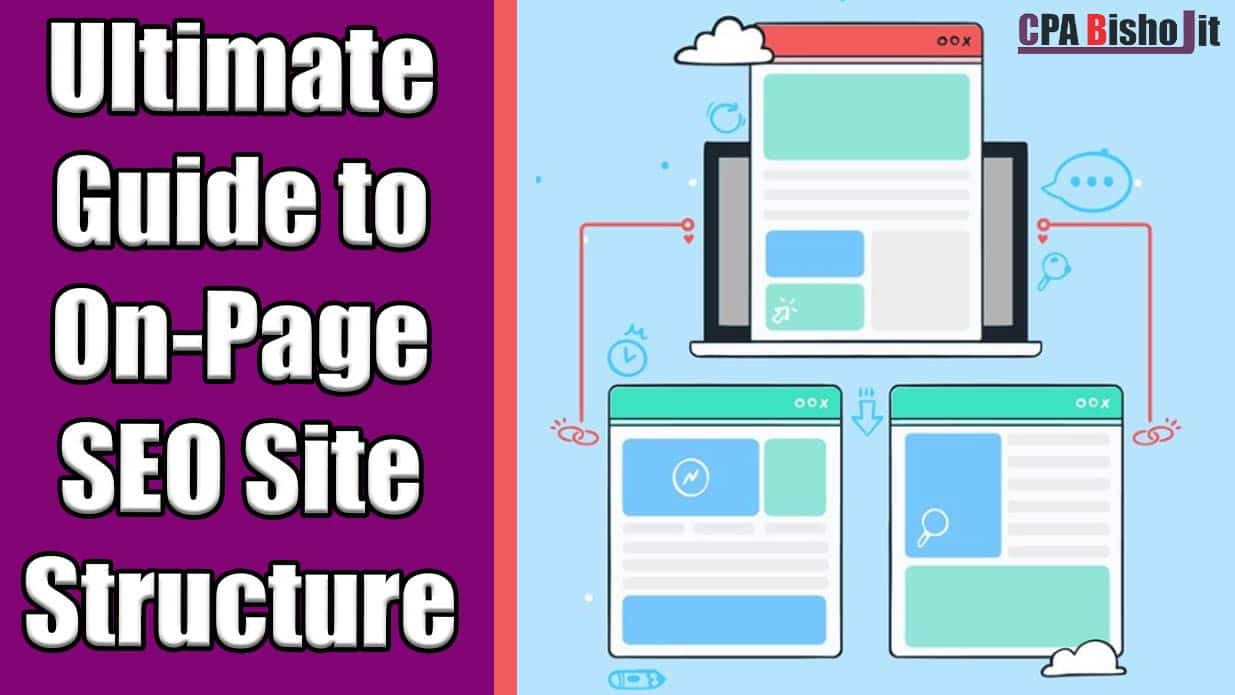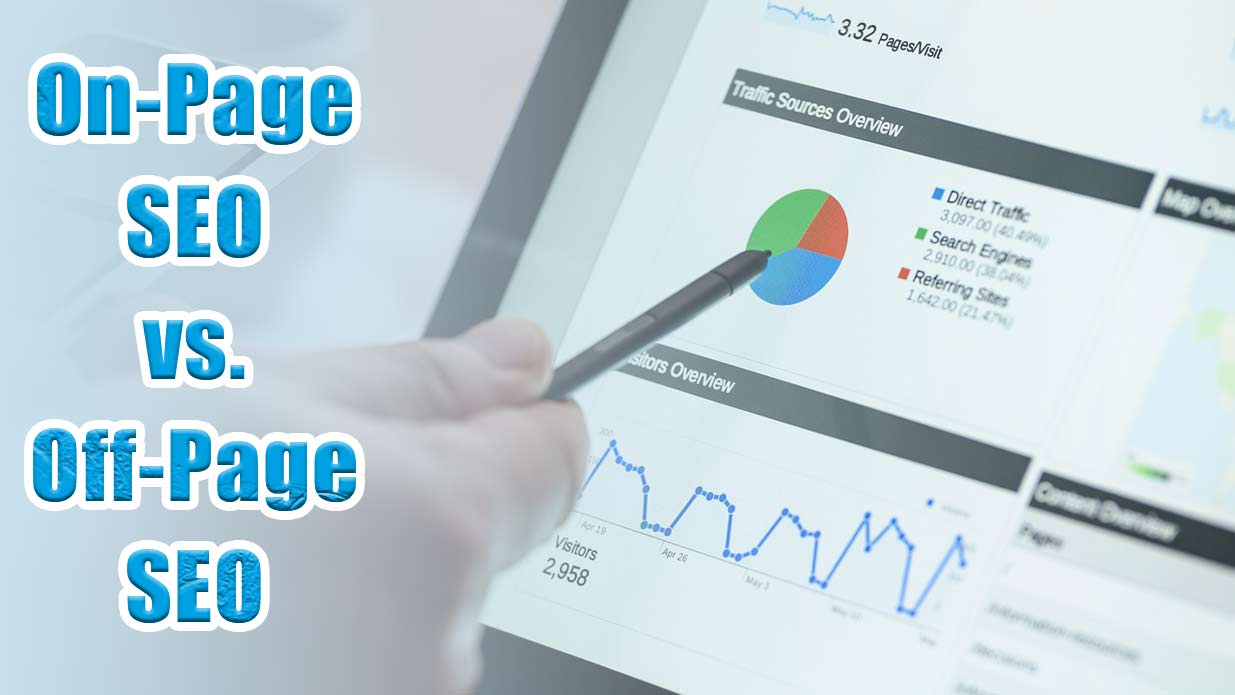Top 8 Best On-Page SEO Tools for 2024 (Free & Paid Options)

Want your WordPress site to dominate search results in 2024? The key lies in using top-notch on-page SEO tools. With 68% of online experiences starting with a search engine, optimizing your site is crucial.
In this guide, we’ll spotlight the best free and paid tools to boost your site’s visibility and performance. Get ready to discover how these tools can transform your SEO game and drive more traffic to your site.
Semrush

Standout features:
Semrush's Site Audit tool dives deep into your website, uncovering issues that might be holding you back. It checks for broken links, SEO errors, and much more.
Top 8 On-Page SEO Tools in 2024
Feeling lost in the SEO jungle? We've got you covered! Check out our top 8 tools for on-page SEO analysis in 2024. These tools will help you sharpen your site's performance, boost rankings, and keep your content in tip-top shape.
Also Read: Ultimate On-Page SEO Checklist for New Websites
| SN: | Tool | For | Starting Price | Free Plan |
|---|---|---|---|---|
| 1 | Semrush | Best All-in-One SEO Platform | $139.95/m | ❌ |
| 2 | Ahrefs | Keyword Research | $99/m | ❌ |
| 3 | Yoast SEO | Comprehensive SEO Analysis | $99/m | ✅ |
| 4 | Surfer SEO | Data-Driven Content Optimization | $59/m | ❌ |
| 5 | Rank Math | Versatile Optimization | $5.75/m | ✅ |
| 6 | Google Search Console | Insights from Google | FREE | ✅ |
| 7 | Screaming Frog | Technical SEO Analysis | £149/Y | ✅ |
| 8 | WP Rocket | Site Speed Optimization | $59/Y | ❌ |
From all-in-one platforms to specialized tools, we’ve found the best of the best to simplify your SEO journey. Ready to upgrade your game? Let’s dive into the details!
1. Semrush

If you're serious about SEO, Semrush is your go-to tool. It’s like having a Swiss Army knife for SEO, packed with features to give you an edge in the search rankings.
Key Features:
- Comprehensive SEO Audit: Semrush's Site Audit tool dives deep into your website, uncovering issues that might be holding you back. It checks for broken links, SEO errors, and much more.
- Keyword Research: Discover high-traffic keywords and track their performance with ease. Semrush offers insights into keyword difficulty and competitive density, helping you target the right terms.
- Competitor Analysis: See what your competitors are up to. Semrush lets you analyze their strategies and discover new opportunities to outperform them.
Limitations:
- Complex Interface: Semrush’s array of features can be overwhelming at first. It’s a bit like navigating a high-tech spaceship without a manual.
- Pricing: It’s on the pricier side compared to other tools, which might be a hurdle for small businesses or individuals.
Pros and Cons
Pricing
Semrush offers several pricing plans starting at $129.95 per month. Each plan scales with features and limits, so you can choose one that fits your needs and budget.
Why It Stands Out
Semrush shines with its comprehensive toolkit that covers every aspect of SEO. From in-depth audits to keyword tracking and competitor insights, it’s designed to give you a complete picture of your SEO performance and opportunities for growth.
2. Ahrefs
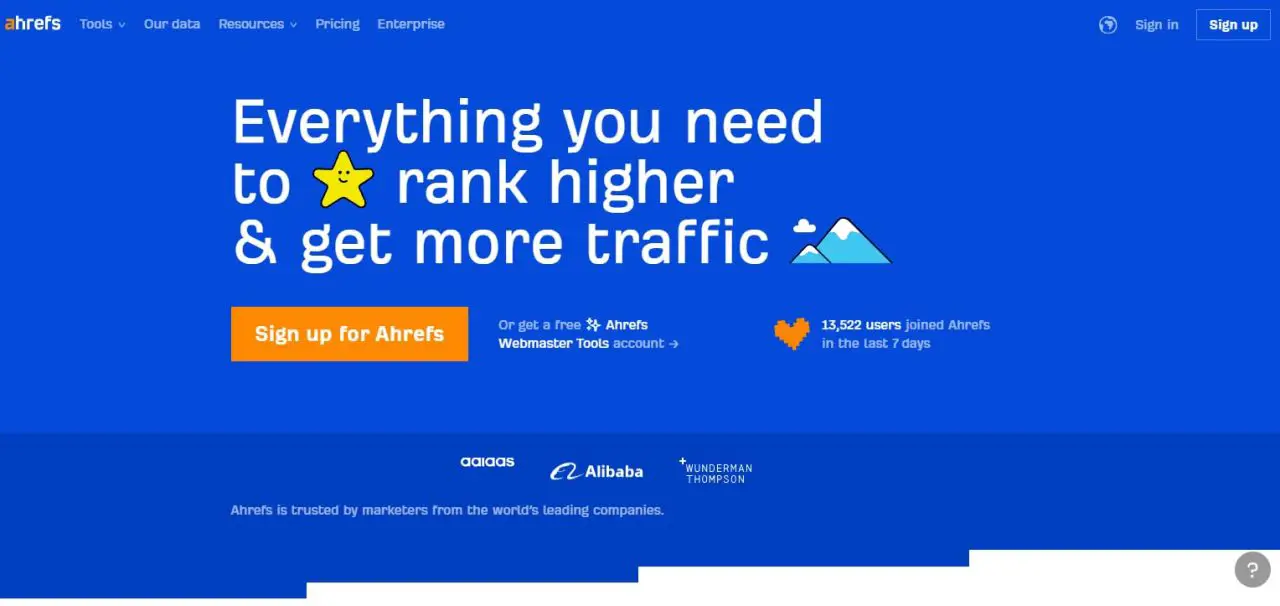
Ahrefs is a powerhouse when it comes to keyword research. If you want to uncover hidden opportunities and fine-tune your content strategy, Ahrefs is your secret weapon.
Key Features:
- Keyword Explorer: Find the best keywords to target with detailed metrics on search volume, keyword difficulty, and potential traffic.
- Content Analysis: Analyze top-performing content in your niche to understand what works and how to compete.
- Site Audit: Identify and fix technical SEO issues on your site to improve overall performance.
Limitations:
- Pricey: Ahrefs is another high-end tool, which might be a stretch for those just starting out or with tight budgets.
- Steep Learning Curve: With so many features, getting the most out of Ahrefs can take some time.
Pros and Cons
Pricing
Ahrefs starts at $99 per month, with higher plans offering more features and larger limits.
Why It Stands Out
Ahrefs excels in keyword research and content analysis, making it a top choice for those focused on optimizing their content and staying ahead of the competition.
3. Yoast SEO
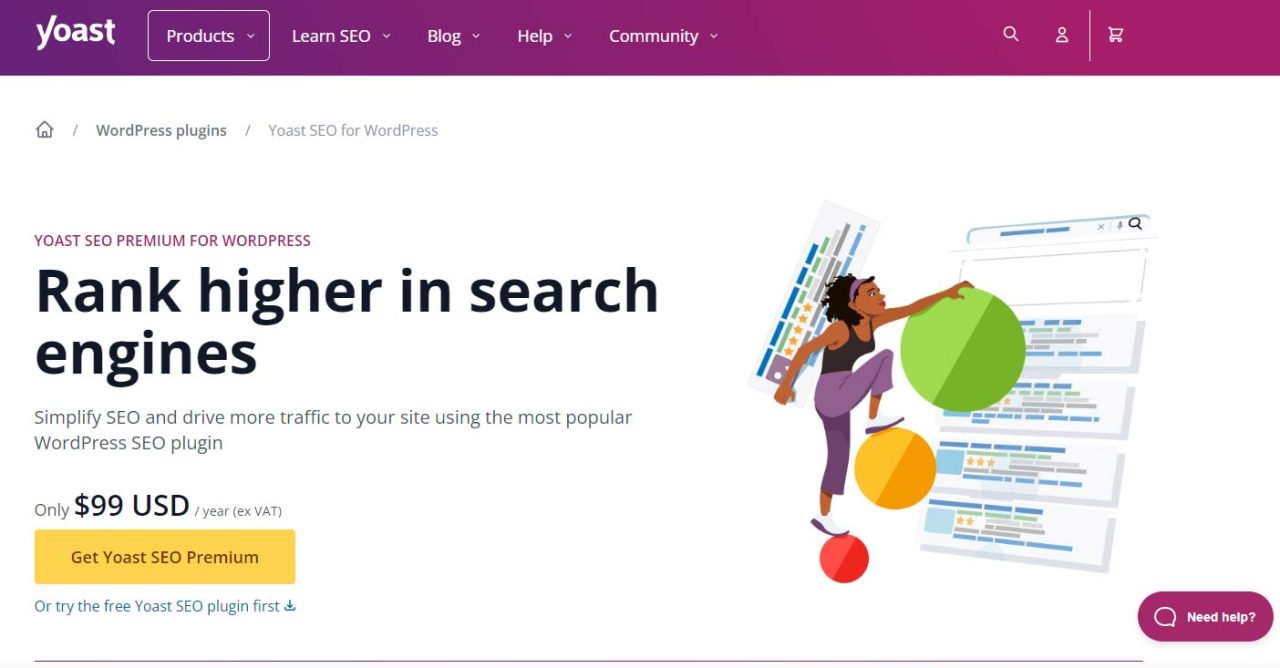
Yoast SEO is often the first name that comes to mind for WordPress users. It’s like the Swiss Army knife for SEO, packed with features to help you get your site into shape and keep it there.
Key Features:
- Content Analysis: Yoast SEO’s content analysis tool provides real-time feedback on your posts and pages. It checks for readability, keyword usage, and more, helping you write content that’s both engaging and optimized.
- XML Sitemaps: Automatically generates sitemaps, helping search engines crawl and index your site more efficiently.
- Breadcrumbs: Adds breadcrumbs to your site’s navigation, improving usability and SEO.
Limitations:
- Complexity for Beginners: The plugin’s extensive features might be overwhelming for newbies.
- Premium Features: Some advanced features are only available in the premium version.
Pros and Cons
Pricing
Yoast SEO is free, with a premium version starting at $99 per year for more advanced features.
Why It Stands Out
Yoast SEO stands out for its user-friendly design and powerful features, making it a favorite among both beginners and seasoned SEO pros.
4. Surfer SEO
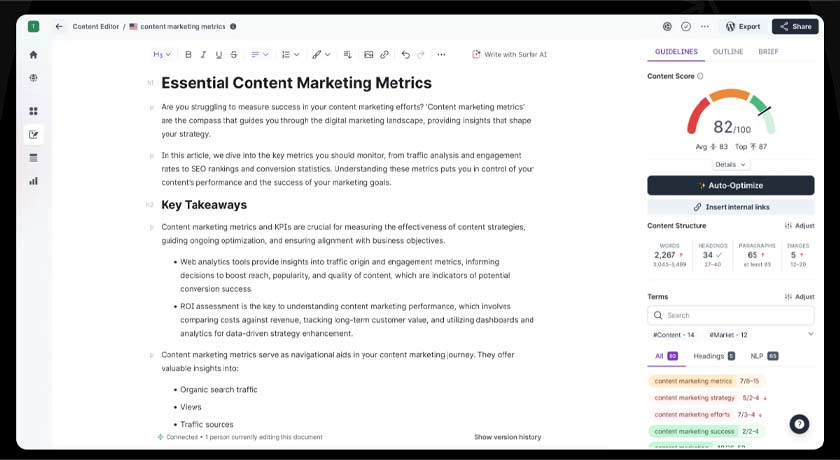
Surfer SEO takes the guesswork out of content optimization. If you want to craft content that ranks well based on data, Surfer SEO is the tool for you.
Key Features:
- Content Editor: Provides real-time recommendations on how to optimize your content for specific keywords.
- SERP Analyzer: Analyzes the top-ranking pages for your target keywords to identify key factors that contribute to their success.
- Audit Tool: Assesses your existing content and offers suggestions for improvement based on current SEO trends.
Limitations:
- Price: Surfer SEO’s advanced features come at a premium.
- Learning Curve: Understanding and using the data effectively can take some time.
Pros and Cons
Pricing
Surfer SEO plans start at $59 per month, with higher tiers offering more features and limits.
Why It Stands Out
Surfer SEO excels with its data-driven approach to content optimization, making it an invaluable tool for those looking to create highly effective, SEO-friendly content.
5. Rank Math SEO
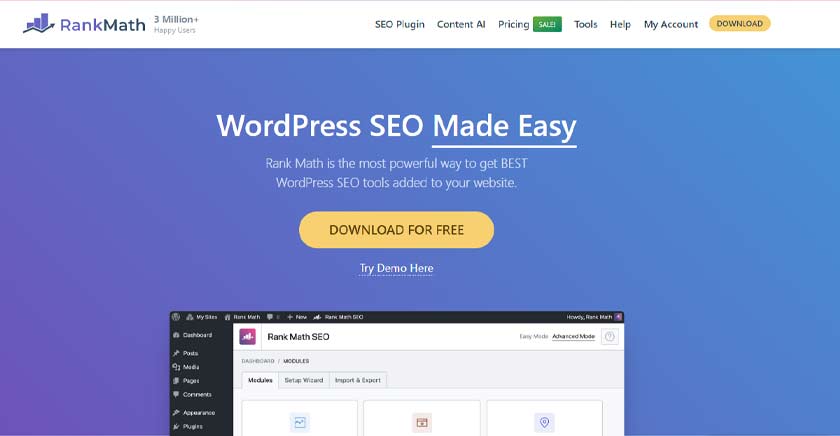
Rank Math SEO is a versatile tool that offers a range of features to optimize every aspect of your WordPress site’s SEO. It’s like having a Swiss Army knife in your SEO toolkit.
Key Features:
- Content AI: Assists in creating SEO-optimized content with ease.
- Schema Markup: Includes 18 pre-defined Schema types for enhancing content visibility.
- Readability Analysis: Provides suggestions to improve content readability and engagement.
Limitations:
- Premium Features: Advanced features are locked behind paid plans.
- Complexity: May be overwhelming for beginners with its extensive options.
Pros and Cons
Pricing
Rank Math offers a free version with essential features. Paid plans start at $5.75 per month for advanced functionalities.
Why It Stands Out
Rank Math SEO stands out with its versatile features and user-friendly design, making it a great choice for those looking to enhance their on-page SEO efficiently.
6. Google Search Console
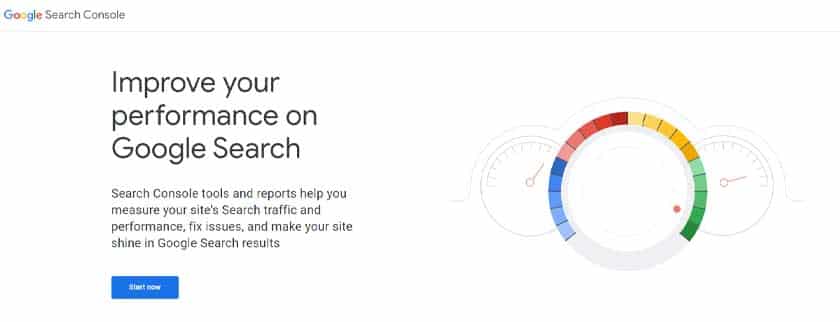
Google Search Console provides direct insights into how Google views your website. It’s essential for understanding your site’s performance and addressing any indexing issues.
Key Features:
- Performance Reports: Track impressions, clicks, and click-through rates for your pages.
- URL Inspection Tool: See how Google crawls and indexes your pages.
- Index Coverage Report: Identify and fix issues that might affect your site’s visibility.
Limitations:
Limited Analysis: Focuses mainly on Google’s perspective and doesn’t offer in-depth competitor analysis.
Pros and Cons
Pricing
Google Search Console is completely free.
Why It Stands Out
Google Search Console is invaluable for understanding how Google interacts with your site and resolving issues that could impact your rankings.
7. Screaming Frog SEO Spider
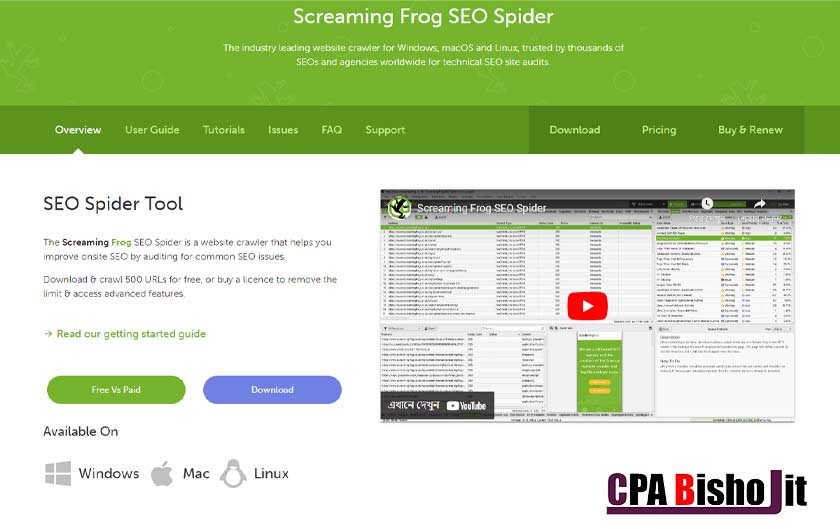
Screaming Frog SEO Spider is a powerful tool for crawling and analyzing your website’s technical SEO aspects. It’s like having a detailed checklist for your site’s SEO health.
Key Features:
- Site Crawling: Identifies issues like broken links, duplicate content, and missing meta tags.
- Technical Insights: Provides insights into site structure, internal linking, and page load times.
- Custom Reports: Generate detailed reports on various SEO elements.
Limitations:
- Complexity: May be challenging for beginners due to its technical nature.
- Cost: The full version comes with a price tag, though there is a free limited version.
Pros and Cons
Pricing
The free version of Screaming Frog offers limited features, with the full version available for £149 per year.
Why It Stands Out
Screaming Frog SEO Spider excels in technical analysis, offering detailed insights that help you optimize your site’s technical SEO and improve overall performance.
8. WP Rocket
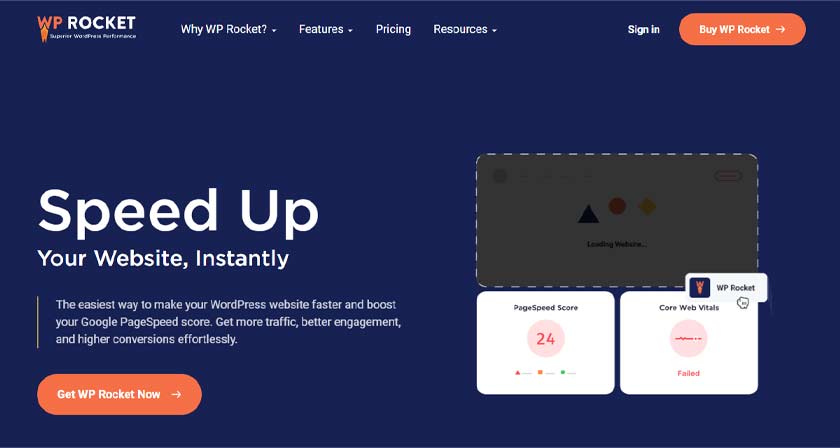
WP Rocket is a caching plugin designed to enhance your site’s speed and performance. Fast-loading sites not only improve user experience but also boost your SEO rankings.
Key Features:
- Page Caching: Speeds up your site by caching static content.
- Minification: Reduces the size of CSS, JavaScript, and HTML files to improve load times.
- Lazy Loading: Defers loading of images and videos until they’re needed, speeding up initial page load.
Limitations:
- Cost: WP Rocket is a premium tool with no free version.
- Compatibility: May require adjustments for some themes or plugins.
Pros and Cons
Pricing
WP Rocket costs $59 per year for a single site license, with higher plans available for multiple sites.
Why It Stands Out
WP Rocket is a top choice for boosting site speed, which is a crucial factor for both user experience and SEO. Its easy setup and powerful features make it a valuable addition to your SEO toolkit.
How to Choose the Best On-Page SEO Tools
With so many on-page SEO tools available, choosing the right one can feel like finding a needle in a haystack. Here’s a guide to help you sift through the options and find the tool that fits your needs.
What to Look for in an On-Page SEO Tool
When selecting an on-page SEO tool, consider these essential factors:
- Ease of Use: You want a tool that’s intuitive and user-friendly. A steep learning curve can slow you down and make SEO feel like a chore. Look for tools with a straightforward interface and clear instructions.
- Feature Set: Different tools offer varying features. Ensure the tool you choose covers key areas such as keyword optimization, content analysis, and technical SEO. A tool that offers a comprehensive set of features can be a game-changer.
- Integration Capabilities: Check if the tool integrates well with other platforms you use, such as content management systems (CMS) or analytics tools. Seamless integration can streamline your workflow and enhance efficiency.
- Reporting and Analytics: Effective tools provide detailed reports and insights. You should be able to track progress, analyze performance, and identify areas for improvement.
- Customer Support: Good support can make a big difference, especially if you encounter issues or need assistance. Look for tools that offer responsive customer support and ample resources, such as tutorials and FAQs.
- Cost: While some tools are free, others come with a price tag. Evaluate whether the cost aligns with your budget and whether the features justify the expense. Sometimes, paying a little more can get you significantly better results.
How to Use On-Page SEO Tools Effectively
Once you’ve selected the right tools, it’s time to put them to work. Here’s how to make the most out of your on-page SEO tools.
Best Practices for On-Page Optimization
- Start with a Comprehensive Audit: Use your SEO tool to perform a thorough site audit. This will help you identify issues such as broken links, duplicate content, and missing meta tags.
- Optimize Content Strategically: Leverage the tool’s content analysis features to optimize your content. Focus on incorporating relevant keywords naturally and improving readability. Quality content that resonates with your audience and search engines is key.
- Monitor and Adjust: SEO is not a set-it-and-forget-it process. Regularly review your tool’s reports and adjust your strategy based on performance data. Continuous monitoring and tweaking can lead to better results over time.
- Enhance User Experience: Use insights from your SEO tool to improve site usability. This includes optimizing page load times, ensuring mobile-friendliness, and enhancing navigation. A positive user experience can boost both engagement and rankings.
- Implement Technical SEO: Don’t overlook technical aspects such as XML sitemaps, schema markup, and site structure. These elements can significantly impact how search engines crawl and index your site.
Common Mistakes to Avoid
- Ignoring Regular Updates: SEO tools often update their features and algorithms. Failing to keep up with these updates can lead to missed opportunities or outdated practices. Stay informed about changes and adapt accordingly.
- Overlooking Mobile Optimization: With a growing number of searches coming from mobile devices, mobile optimization is crucial. Ensure your site is fully responsive and performs well on all devices.
- Focusing Solely on Keywords: While keywords are important, don’t let them overshadow other factors like content quality and user experience. A balanced approach is more effective for long-term success.
- Neglecting Site Speed: Site speed is a critical factor for both user experience and SEO. Regularly check your site’s performance and address any speed-related issues promptly.
- Forgetting to Analyze Competitors: Use your tool to keep an eye on your competitors. Understanding their strategies and performance can provide valuable insights and help you stay competitive.
Conclusion
In 2024, choosing the right on-page SEO tools is crucial for boosting your site’s visibility and rankings. Tools like Semrush, Ahrefs, Yoast SEO, Surfer SEO, Rank Math SEO, Google Search Console, Screaming Frog SEO Spider, and WP Rocket each offer unique benefits, from keyword research to performance optimization.
When selecting tools, prioritize ease of use, essential features, and cost. Implement best practices, avoid common pitfalls, and use these tools to enhance your on-page SEO strategy. With the right approach, you’ll improve your site’s performance and achieve your SEO goals effectively.


